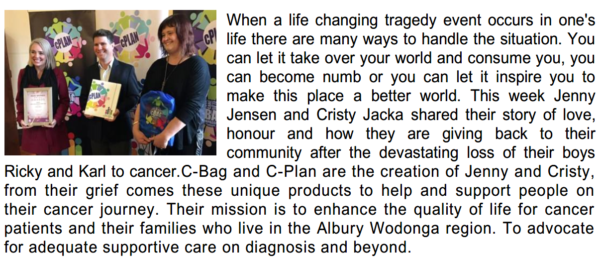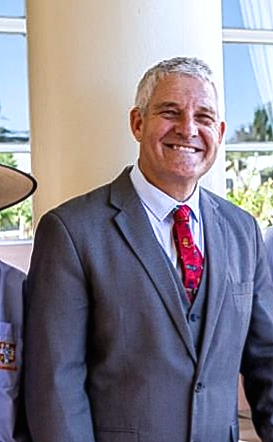
Category Archives: Guest Speakers
Club Meeting 7 July 2021

Guest Speaker, Mark Geraets has a wealth of experience from schools in South Korea, Switzerland, Bangladesh, New Zealand and the Solomon Islands and is now Principal of The Scots School Albury. He discussed the differences between students in Australia and other parts of the world — and the unexpected similarities of students of certain ages the world over. He shared his experiences of the International Baccalaureate program and the NSW Curriculum with an additional reference to a new learning model at Scots called Design for Deep Learning. And finally, he talked briefly about the tradition of NSW’s oldest regional boarding school and what lies ahead for the school in 2021 and beyond.
Guest Speaker

Our speaker Xavier Mardling, Editor of the Border Mail. The BM is 115 years old and has a rich history in the landscape of Australian print media. An interesting quote from Xavier was “if you receive a call asking you to put something in the paper, then that’s advertising. If you are asked to keep something out of the paper, then it’s news”. Xavier made the point that in the early 20th century, newspapers were rocked by the invention of the telegraph, which was widely believed would spell doom for the print media as news would become immediately available. Just as this didn’t occur, Xavier believes that the rise of online platforms is actually an opportunity for media and in particular, local media organisations such as the BM. This is because people always want to know what’s going on in their local community and more importantly, deserve to be able to find out. In the end, Xavier was adamant that journalists should report the facts and nothing more. “If a person calls up to say it’s raining and another calls up to say it’s sunny, then look out the window and find out for yourself”.
Guest Speakers

Guest speakers were from the Rotary Club of Albury North, with the topic being “The Drought”. Roger Paterson, Bill MacDonald and Andrew Hore all made passionate speeches which were personal and factual accounts of the effects that drought is having on their lives. Despite the fact that we have had good rain over the past few weeks, we are a long way from things being ok. Roger told us that his farm has been in the family for 97 years and that this is the worst drought ever. A telling sign of the drought is the fact that their main dam is 12 metres deep when full. At the moment, it is down to 1/2 metre deep.
He spoke of hidden costs associated with the drought, which include cartage and pumping of water. For example, the strain on Rotary Club of Albury Hume
District 9790 pumps is immense, so the family needs to have multiple pumps to prepare for the almost certain scenario that one will fail at an inopportune time. Overall, the drought has cost over $180,000 in lost income in the past year. Adding to this is the fact that costs have risen in excess of $300,000 over the same period of time. Roger told us that planning for drought is an important part of running a farm. However, this drought is off the charts and no amount of planning could take into consideration the severity of this particular event.
Bill went on to tell us that his family originally took possession of the property in 1863. There is a spring on their farm that feeds Sweetwater Creek, which is currently dry. The only other time that this has happened was in 1916. He also told us that there is an old farm saying that if the rabbits are breeding, then there’s a good year ahead. The rabbits aren’t breeding this year, which is a strong indicator that things aren’t looking good for the upcoming season. Andrew made the point that mental fatigue is an everyday reality of dealing with drought. Just like humans need more than one feed a day, animals need proper feeding routines. This means that Andrew and his family need to be out and about feeding stock seven days a week. There are no days off to rest and recuperate. This can lead on to mental health issues as farmers struggle with the realities of the worst drought on record. Let’s do all we can to look after our farmers, because without them, we wouldn’t hav
